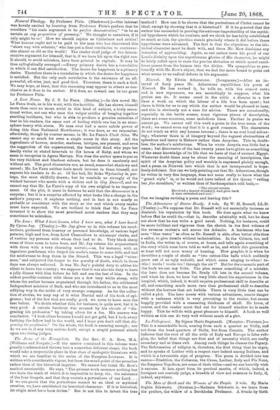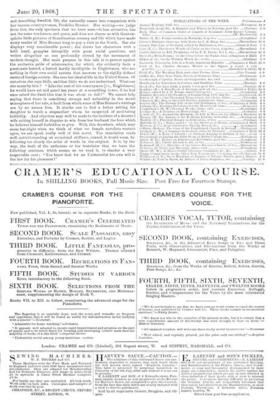and describin g Swedish life, she naturally comes into comparison with
her famous countrywoman, Fredrika Bremer. Her writing—we judge from this, the only specimen that we have seen—is less attractive, has not the same tenderness and grace, and does not charm us with those ex- quisite little pictures of Scandinavian scenery and life which have made every reader of Miss Bremer long to pay a visit to the North. But she displays very considerable power; she draws her characters with a bold hand, grapples intrepidly with great social questions, and writes altogether as one profoundly stirred by the movement of modern thought. Her main purpose in this tale is to protest against the exclusive pride of aristocracies, for which she evidently feels a passionate hatred, a hatred hardly intelligible to Englishmen, who see nothing in their own social system that answers to the rigidly defined castes of foreign society. She sees her ideal of life in the United States. Of ourselves she says little, and that little we do not understand. What can she mean by this? "Like the rest of his countrymen [i.e., Englishmen] he would have sat and gazed ten years at a crumbling tower, if he had once seized the fixed idea that it was about to fall ?" We cannot help saying that there is something strange and unhealthy in the moral atmosphere of her tale, a fault from which some of Miss Bremer's writings are by no means free. It shocks one to find a father setting his daughter to watch a stepmother whom he suspected of meditating infidelity. And objection may well be made to the incident of a deserted wife setting herself in disguise to win from her husband the love which he believes himself forbidden to give. With this drawback, which may seem but slight when we think of what our female novelists venture upon, we can speak really well of this novel. The translation reads well, notwithstanding an occasional stiffness, caused, it would seem, by following too closely the order of words in the original. Is it, by the way, the fault of the authoress or the translator that we have the following sentence, which seems, as we read it, to slander a very respectable sect; "You know that for an Universalist his own will is the law for his pleasures ?"



































 Previous page
Previous page